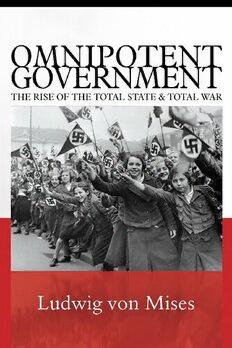
Omnipotent Government: The Rise of the Total State and Total War (Lib Works Ludwig Von Mises PB) PDF
Preview Omnipotent Government: The Rise of the Total State and Total War (Lib Works Ludwig Von Mises PB)
OMNIPOTENT GOVERNMENT OMNIPOTENT GOVERNMENT THERISEOFTHETOTALSTATEANDTOTALWAR Ludwig von Mises LvMI LF MISESINSTITUTE C,,YUP PrintedintheUnitedStatesofAmerica Allrightsreserved. isbookmaynotbere- produced,inwholeorinpart,inanyform(ex- ceptbyreviewersforthepublicpress),with- out wrien permission from the publishers. AWARTIMEBOOK ’ . Preface I dealing with the problems of social and economic policies, the social sciences consider only one question: whether the measuressuggestedarereallysuitedtobringingabouttheef- fectssoughtbytheirauthors,orwhethertheyresultinastate of affairs which—from the viewpoint of their supporters—is even moreundesirablethanthepreviousstatewhichitwasintendedto alter. e economist does not substitute his own judgment about the desirability of ultimate ends for that of his fellow citizens. He merelyaskswhethertheendssoughtbynations,governments,po- litical parties, and pressure groups can indeed be aained by the methodsactuallychosenfortheirrealization. It is, to be sure, a thankless task. Most people are intolerant of any criticism of their social and economic tenets. ey do not understandthattheobjectionsraisedreferonlytounsuitablemeth- ods and do not dispute the ultimate ends of their efforts. ey are not prepared to admit the possibility that they might aain theirendsmoreeasilybyfollowingtheeconomists’advicethanby disregardingit. eycallanenemyoftheirnation, race, orgroup anyonewhoventurestocriticizetheircherishedpolicies. is stubborn dogmatism is pernicious and one of the root causes of the present state of world affairs. An economist who asserts that minimum wage rates are not the appropriate means of raising the wage earners’ standard of living is neither a “labor baiter”noranenemyoftheworkers. Onthecontrary,insuggesting more suitable methods for the improvement of the wage earners’ materialwell-being,hecontributesasmuchashecantoagenuine promotionoftheirprosperity. Topointouttheadvantageswhicheverybodyderivesfromthe working of capitalism is not tantamount to defending the vested interests of the capitalists. An economist who forty or fiy years ago advocated the preservation of the system of private property andfreeenterprisedidnotfightfortheselfishclassinterestsofthe then rich. He wanted a free hand le to those unknown among hispennilesscontemporarieswhohadtheingenuitytodevelopall those new industries which today render the life of the common man more pleasant. Many pioneers of these industrial changes, it is true, became rich. But they acquired their wealth by supplying thepublicwithmotorcars,airplanes,radiosets,refrigerators,mov- ing and talking pictures, and a variety of less spectacular but no ii OmnipotentGovernment less useful innovations. ese new products were certainly not an achievement of offices and bureaucrats. Not a single techni- cal improvement can be credited to the Soviets. e best that the Russianshaveachievedwastocopysomeoftheimprovementsof thecapitalistswhomtheycontinuetodisparage. Mankindhasnot reached the stage of ultimate technological perfection. ere is ample room for further progress and for further improvement of the standards of living. e creative and inventive spirit subsists notwithstanding all assertions to the contrary. But it flourishes onlywherethereiseconomicfreedom. Neither is an economist who demonstrates that a nation (let us call it ule) hurts its own essential interests in its conduct of foreign-trade policies and in its dealing with domestic minority groups,afoeofuleanditspeople. Itisfutiletocallthecriticsofinappropriatepoliciesnamesand to cast suspicion upon their motives. at might silence the voice oftruth,butitcannotrenderinappropriatepoliciesappropriate. e advocates of totalitarian control call the aitudes of their opponents negativism. ey pretend that while they themselves are demanding the improvement of unsatisfactory conditions, the othersareintentuponleingtheevilsendure. isistojudgeall socialquestionsfromtheviewpointofnarrow-mindedbureaucrats. Onlytobureaucratscantheideaoccurthatestablishingnewoffices, promulgating new decrees, and increasing the number of govern- ment employees alone can be described as positive and beneficial measures,whereaseverythingelseispassivityandquietism. e program of economic freedom is not negativistic. It aims positively at the establishment and preservation of the system of marketeconomybasedonprivateownershipofthemeansofpro- ductionandfree enterprise. Itaims atfree competitionandat the sovereignty of the consumers. As the logical outcome of these demandsthetrueliberalsareopposedtoallendeavorstosubstitute government control for the operation of an unhampered market economy. Laissez faire, laissez passer does not mean: let the evils last. Onthecontrary,itmeans: donotinterferewiththeoperation of the market because such interference must necessarily restrict output and make people poorer. It means furthermore: do not abolish or cripple the capitalist system which, in spite of all ob- stacles put in its way by governments and politicians, has raised thestandardoflivingofthemassesinanunprecedentedway. Libertyisnot,astheGermanprecursorsofNazismasserted,a negative ideal. Whether a concept is presented in an affirmative orinanegativeformismerelyaquestionofidiom. Freedomfrom want istantamounttotheexpressionstrivingaerastateofaffairs Preface iii under whi people are beer supplied with necessities. Freedom of speeistantamounttoastateofaffairsunderwhieverybodycan saywhathewantstosay. Attheboomofalltotalitariandoctrinesliesthebeliefthatthe rulersarewiserandloierthantheirsubjectsandthattheythere- fore know beer what benefits those ruled than they themselves. WernerSombart,formanyyearsafanaticalchampionofMarxism andlateranolessfanaticaladvocateofNazism,wasboldenoughto assertfranklythattheFührergetshisordersfromGod,thesupreme Führer of the universe, and that Führertum is a permanent revela- (cid:3) tion. Whoever admits this, must, of course, stop questioning the expediencyofgovernmentomnipotence. ose disagreeing with this theocratical justification of dicta- torshipclaimforthemselvestherighttodiscussfreelytheproblems involved. ey do not write state with a capital S. ey do not shrink from analyzing the metaphysical notions of Hegelianism and Marxism. ey reduce all this high-sounding oratory to the simplequestion: arethemeanssuggestedsuitabletoaaintheends sought? Inansweringthisquestion, theyhopetorenderaservice tothegreatmajorityoftheirfellowmen. LudwigvonMises NewYork,January, ACKNOWLEDGMENT IgratefultotheRockefellerFoundationandtotheNational Bureau of Economic Research for grants which enabled me to un- dertake this study. Mr. Henry Hazli has helped me greatly with hiscriticismandsuggestionsandbyeditingthewholemanuscript. Mr.ArthurGoodmanhasadvisedmeinlinguisticandstylisticprob- lems. Mr.EugeneDavidsonofYaleUniversityPresshasassistedme in many ways. e responsibility for all opinions expressed is, of course,exclusivelymyown. (cid:3) DeutserSozialismus(Charloenburg,),p.. Americaned.,ANewSocial Philosophy,translatedandeditedbyK.F.Geiser(Princeton,),p.. Contents P I PartI. eCollapseofGermanLiberalism I. GL . eAncienRégimeandLiberalism . eWeaknessofGermanLiberalism . ePrussianArmy . eConstitutionalConflictinPrussia . e“LileGerman”Program . eLassalleEpisode II. TTM . ePrussianArmyintheNewGermanEmpire . GermanMilitarism . eLiberalsandMilitarism . eCurrentExplanationoftheSuccessofMilitarism PartII. Nationalism III. E . eNewMentality . eState . ePoliticalandSocialDoctrinesofLiberalism . Socialism . SocialisminRussiaandinGermany . Interventionism . EtatismandProtectionism . EconomicNationalismandDomesticMonopolyPrices . Autarky . GermanProtectionism IV. EN . ePrincipleofNationality . eLinguisticGroup . LiberalismandthePrincipleofNationality . AggressiveNationalism . ColonialImperialism . ForeignInvestmentandForeignLoans . TotalWar . SocialismandWar
